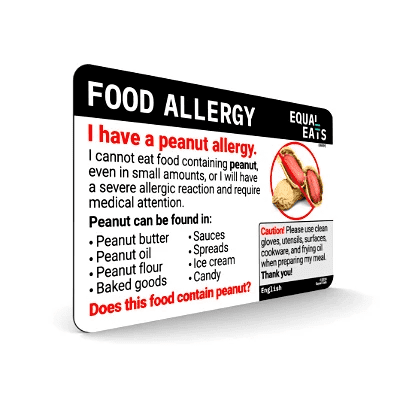
Costa Rica Spanish English Allergy and related vocabulary

Saturday, August 12, 2023
9:32 AM
You may have the need to discuss your or your family's allergies with others. You may find it useful to copy the text here, remove what doesn't apply to you, and take a printout, and a copy on your cell phone/tablet/laptop/remarkable/note paper to carry with you. If you or someone in your party is severely allergic, carry one or more copies in your passport, so you always have them ready and can pass them out.
You may want to check these people out: https://equaleats.com/?ref=AbilityOasis (We make a small commission if you use this link and purchase, if you want to make sure we don't get the commission, just edit the URL to exclude us! 100% of referral commissions go to charitable causes.) They have a large number of credit card sized cards to explain your allergy to people in a foreign language, not just Spanish. For our country specifically, make sure you pick the Latin American Spanish (as opposed to the Castilian/Spain Spanish.) While they may seem expensive at first glance, if you have an allergy that is going to kill you or otherwise spoil a trip for you, the extra cost isn't all that much for the piece of mind and a higher probability of a good trip.
Even if you can't speak the words - you can show the restaurant, hotel, airport, hospital the words and sentences below.
It may be better to be 'more generic' rather than 'more specific' in the same way that you probably run into problems with people in your country not 'getting it'. So if you are allergic to 17 fish, maybe better to say you are allergic 'to fish'. Similarly, if you are only, but severely, allergic to bovine milk - just say you are allergic to 'milk' (leche)
In coming to this page, our assumption is you are an English speaker (or someone who knows how to describe your allergy etc.., in English) and you don't speak a lot of Spanish, so you most importantly want as simple as possible way to describe your concern while travelling. While there are 'more polite' ways of saying some of these things, when it comes to allergies, we recommend the words below. The 'more polite' words may result in the person thinking that it is a preference and they may not take it as seriously - with no intention of malice. So while your Spanish training course might tell you the more 'polite' way to ask for something (and may not even tell you that is what they are doing), we recommend going with the more direct ways below. So said "I can not' rather than the more common beginner level courses way of saying "I'd prefer to not…" or "I'd not like…". Note that in several training courses, they teach you these 'more polite' ways while telling you the more direct meaning. But with allergies and related - that just isn't the safe way for you to do it.
• los cacahuetes (peanuts)
• Tengo alergia a los frutos secos/nueces de arbol.
• el leche (milk)
• los huevos (eggs)
• la soja (soy)
• el marisco / los mariscos (seafood)
• el pez (fish)
• la mostaza (mustard)
• el gluten (gluten)
How to say you "can’t" eat something at all?
Use “no puedo comer…” (I cannot eat….).
• No puedo comer huevos. (I can’t eat eggs.)
• No puedo comer cacahuetes. (I can’t eat peanuts.)
• No puedo beber leche. (I can’t drink milk.)
• No puedo comer mariscos. (I can’t eat seafood.)
You can also ask if your allergen item was used in a portion of the making of a dish:
• ¿Este plato lleva huevos? (Are there eggs in this dish?)
And if you know the food item is in a specific dish but want it made without it:
• ¿Pueden quitar las almendras, por favor? (Can you please remove the almonds?)
• ¿Se puede comer este plato sin almendras? (Can I have this dish without the almonds?)
Respiratory allergies
The most common breathing allergies:
• los gatos (cats) – la alergia a los gatos (cat allergy)
• los perros (dogs) – la alergia a los perros (dog allergy)
• el polvo (dust) – la alergia al polvo (dust allergy)
• el moho (mould) – la alergia al moho (mould allergy)
• el polen (pollen) – la alergia al polen (pollen allergy)
• las mascotas (pets) – la alergia a las mascotas (pets allergy)
• la lana (wool) – la alergia a la lana (wool allergy)
Other common allergies
• el látex (latex) – la alergia al látex (latex allergy)
• la penicilina (penicillin) – la alergia a la penicilina (penicillin allergy)
• las abejas (bees) – la alergia a las picaduras de abeja (allergy to bee stings)
• las avispas (wasps) – la alergia a las picaduras de avispa (allergy to wasp bites)
I'm allergic to …:
Say “Soy alérgico(a)…”, ending with the letter “o” if you are a male and “a” if you are a female. Then follow that with “al/ a la/ a los/ a las”, depending on which allergen you’re referring to.
• Soy alérgica a la soja. (I’m allergic to soy.) (female, singular noun)
• Soy alérgico a la soja. (I’m allergic to soy.) (male, singular noun)
• Soy alérgico al polen. (I’m allergic to pollen.) (male, singular noun)
• Soy alérgica al polen. (I’m allergic to pollen.) (female, singular noun)
• Soy alérgico a las mascotas. (I’m allergic to pets.) (female, plural noun)
• Soy alérgico a los perros. (I’m allergic to dogs.) (male, plural noun)
Food Allergy Cards | Equal Eats | Translation Cards in 50 Languages https://equaleats.com